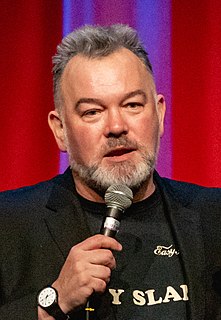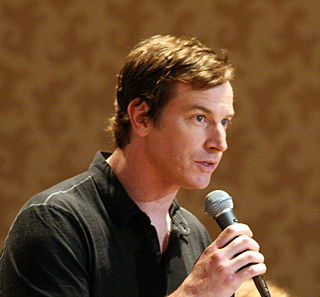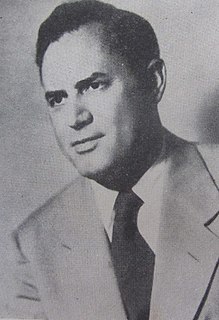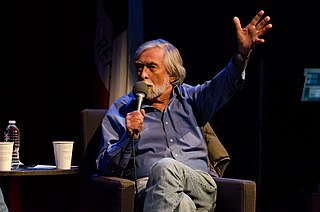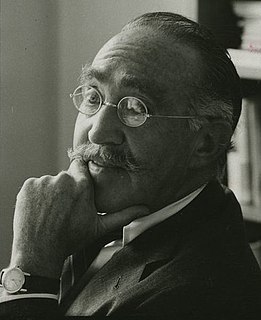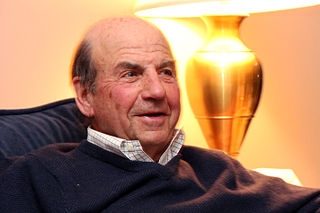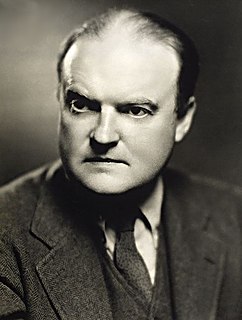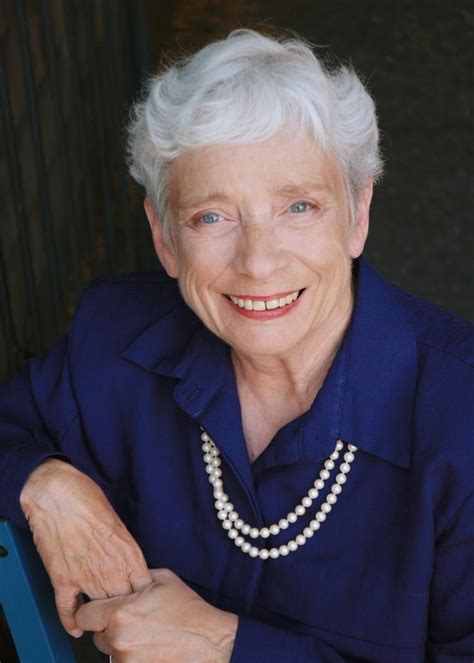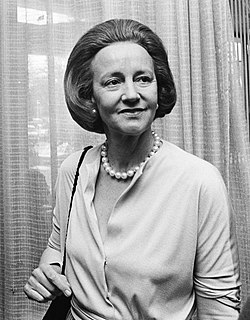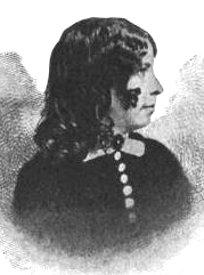Top 415 Publisher Quotes & Sayings - Page 7
Explore popular Publisher quotes.
Last updated on April 17, 2025.
I taught everyone a very bad lesson at my publisher because they actually gave me deadlines this time and I'm now meeting them. I used to say, "Here's my book; it's six years late." I'm so much faster now, and work differently. With all the years of writing, I think I still draft as obsessively, but I think back to writing. On your first story, you start at draft one. On your second story, you start at draft ten. On your third story, you start at draft one hundred. If you need a hundred and eight drafts, you may write eight instead of a hundred and eight.
Next to the defeated politician, the writer is the most vocal and inventive griper on earth. He sees hardship and unfairness wherever he looks. His agent doesn’t love him (enough). The blank sheet of paper is an enemy. The publisher is a cheapskate. The critic is a philistine. The public doesn’t understand him. His wife doesn’t understand him. The bartender doesn’t understand him.
We need prizes as publishers... to focus attention on books, for people to know what to go look for. But often in my opinion and in probably everyone's opinion, the right books don't get chosen. Still we need books to be chosen even if they are not exactly the right ones, otherwise many people won't know what to read. As a publisher, I feel prizes are important for the publishing business. But as a writer, I think, writers shouldn't get too distracted by prizes because very often they don't go to the right person. You shouldn't take it too seriously if you haven't won a prize.
The people wanted to believe that the Negroes couldn't learn to read music but had a natural talent for it. So we never played with no music. I'd get all the latest Broadway music from the publisher, and we'd learn the tunes and rehearse them until we had them all down pat- never made no mistakes. All the high-tone, big-time folks would say, isn't it wonderful how these untrained, primitive musicians can pick up all the latest songs instantly without being able to read music?
In some cases, people are silent; they're being complacent. But we're also seeing people speak out against some of these raids, these arrests. So for example, the Townhouse Gallery - the outreach director gave an interview to Ahram Online, which is a semi-official news agency here. And he sort of dismissed it, played it down. But the publisher from the publishing house - the Merit Publishing House, which was raided - he said this won't scare us; we will continue to dream of a free country, a country with social justice, and this won't silence us.
The most durable thing in writing is style, and style is the most valuable investment a writer can make with his time. It pays off slowly, your agent will sneer at it, your publisher will misunderstand it, and it will take people you have never heard of to convince them by slow degrees that the writer who puts his individual mark on the way he writes will always pay off.
The one affectation I have forced on the publisher... are my apostrophe-free ellisions. Because I write my scripts to read myself, I dont spell 'don't' with an apostrophe. I spell it 'dont'. We all know the word and it seems foolish to put in an extraneous apostrophe. Punctuation marks are devices we use to make the meaning of sentences clear. There is nothing confusing about a word like 'dont' printed without an apostrophe to indicate an omitted letter.
I never had a plan, except to write. I love what I do, and have from the beginning. Loving what you do makes it a lot easier to work, every day, to face the tough spots and heel in for the long haul. Nothing against plans; they work for some people. But for me, if I'd been planning, worrying about numbers, trying to micro-manage my career, I wouldn't have focused on the writing. If you don't write, you're not read. If you're not read, you don't sell. So that's my Master Plan, I guess. Write the books, let the agent agent, the editor edit, the publisher publish.
The one-two punch of New York media calling up every agency and corporate advertiser, keeping lists of advertisers who stayed on - " i.e., with Bill O'Reilly " - and those who fled, worked. As the publisher of a center-right magazine, this is disturbing. It sets a very bad precedent about the power of advertiser pressure and sends a message as an organization that you can essentially be blackmailed into getting rid of - " no kidding!
Hollywood is a showman's paradise. But showmen make nothing; they exploit what someone else has made. The publisher and the play producer are showmen too; but they exploit what is already made. The showmen of Hollywood control the making - and thereby degrade it. For the basic art of motion pictures is the screenplay; it is fundamental, without it there is nothing. Everything derives from the screenplay, and most of that which derives is an applied skill which, however adept, is artistically not in the same class with the creation of a screenplay.
One of the first TV shows that I did was this prank show. And we did a prank where we took a Michael Jackson impersonator and I played his publisher.I was just really good at my job.We were just about to go onto the field to throw out the first pitch just two weeks after 9\11. It was a huge security breach, and we made a lot of cops look really dumb. Producers of the show thought it would be really funny and I didn't think about it because I was a young dumb comedian. So I got arrested and went to jail in the Bronx, and now I can never go back to Yankee Stadium.
I spent almost two years working on this book ['March'] before we ever had a publisher, before we ever had a title. And when you're reading it, and you're writing it, and you're ingesting it, sometimes a single word just comes up over and over and over again. And if you're trying to capture the essence of what it is you're trying to tell, you don't have a whole lot of space.
Legislators who are of even average intelligence stand out among their colleagues. . . . A cultured college president has become as much a rarity as a literate newspaper publisher. A financier interested in economics is as exceptional as a labor leader interested in the labor movement. For the most part our leaders are merely following out in front; they [only] marshal us in the way that we are going.
Times have changed since a certain author was executed for murdering his publisher. They say that when the author was on the scaffold he said good-bye to the minister and to the reporters, and then he saw some publishers sitting in the front row below, and to them he did not say good-bye. He said instead, "I'll see you again."
I think that in the first place, why we can get excited about [Buckminster ] Fuller, why it's plausible that people might - why my publisher would publish this book [You belong to the universe] about it long after he's dead and irrelevant by many standards has to do with the fact that he was in a sense coming up with this job for himself that is the job that we now refer to when we speak about world change.
The syndicates take the strip and sell it to newspapers and split the income with the cartoonists. Syndicates are essentially agents. Now, can you imagine a novelist giving his literary agent the ownership of his characters and all reprint, television, and movie rights before the agent takes the manuscript to a publisher? Obviously, an author would have to be a raving lunatic to agree to such a deal, but virtually every cartoonist does exactly that when a syndicate demands ownership before agreeing to sell the strip to newspapers.
I always think about Katharine Graham - she was the publisher of The Washington Post. In her autobiography she talks about the way her parents met. Her father was, I think, in New York just walking by on his way home and looked into a store and saw the lady that became his wife. It was just pure luck. And she said that it once again reminds her of the role that luck and chance play in our life. I really believe that, too.
Despite wanting to work in publishing, I was a publisher's worst nightmare: I rarely bought new books. So my goal was to publish the kind of books I would buy, and read. My reading habits have changed since starting the press. The only other "goal", per say, is to continue to experiment. I don't want the press to ever fall into a formula, or to be pigeonholed - "They do great reissues of modernist poets!" - I want to keep pushing, exploring the kind of title we can get away with. And working with authors who challenge the way I think about writing, editing and reading.
I was interested in creating things that I could be proud of and so, you know, I was interested in being an editor of a magazine, things that I could be proud of, and so, you know, I was interested in being an editor of a magazine, but in order to be an editor of a magazine I had to become a publisher as well. I had to pay the bills. I had to worry about the printing and the paper manufacturing and the distribution of that magazine.
The publisher, Jeff Johnson, who has offered not a word of explanation to me, has privately told people that he hated every word that I wrote. I assume that mostly refers to my exposing the lies used by President Bush to justify the invasion of Iraq. Fortunately sixty percent of Americans now get the point, but only after tens of thousand of Americans and Iraqis have been killed and maimed as the carnage spirals out of control. My only regret is that my pen was not sharper and my words tougher.
In pulp fiction it is a rigid convention that the hero's shoulders and the heroine's balcon constantly threaten to burst their bonds, a possibility which keeps the audience in a state of tense expectancy. Unfortunately for the fans, however, recent tests reveal that the wisp of chiffon which stands between the publisher and the postal laws has the tensile strength of drop-forged steel.
The talk shows are stuffed full of sufferers who have regained their health--congressmen who suffered through a serious spell of boozing and skirt-chasing, White House aides who were stricken cruelly with overweening ambition, movie stars and baseball players who came down with acute cases of wanting to trash hotel rooms while under the influence of recreational drugs. Most of them have found God, or at least a publisher.
Every publisher or agent I've ever met told me the same thing - that Irish readers don't want to read about the bad old days of the Troubles; neither do the English and Americans - they only want to read about the Ireland of The Quiet Man, when red-haired widows are riding bicycles and everyone else is on a horse.
Each of my books has taken me a different length of time to write - eight months for 'Seesaw Girl,' eight months for 'Shard,' three years for 'When My Name Was Keoko!' The publisher takes another year and a half to work on the book, so altogether each book can take up to three or four years to publish.
A young poet in America should not be advised at the outset to give up all for the Muse-to seclude himself in the country, to live hand from mouth in Greenwich Village or to escape to the Riviera. I should not advise him even to become a magazine editor or work in a publisher's office. The poet would do better to study a profession, to become a banker or a public official or even to go in for the movies.
The point about sales is relevant because it suggests there are cultures out there that are supporting and consuming, on a vast scale, challenging works of literature. Works of literature that in the United States would sell only a few thousand copies, if they managed to find a publisher at all. The success of these texts in Spain or Italy or wherever contributes to a kind of national conversation that we're perhaps not having here in the U.S.
To me a book is a message from the gods to mankind; or, if not, should never be published at all. A message from the gods should be delivered at once. It is damnably blasphemous to talk about the autumn season and so on. How dare the author or publisher demand a price for doing his duty, the highest and most honorable to which a man can be called?
I do ask every publisher, every editor, and every newsman in the nation to reexamine his own standards, and to recognize the nature of our country's peril. In time of war, the government and the press have customarily joined in an effort based largely on self-discipline, to prevent unauthorized disclosures to the enemy. In time of "clear and present danger," the courts have held that even the privileged rights of the First Amendment must yield to the public's need for national security.
It was amazing to me then, and still is, that so many people who wander into bookshops don't really know what they're after--they only want to look around and hope to see a book that will strike their fancy. And then, being bright enough not to trust the publisher's blurb, they will ask the book clerk the three questions: (1) What is it about? (2) Have you read it? (3) Was it any good?
Once the government can demand of a publisher the names of the purchasers of his publication, the free press as we know it disappears. Then the spectre of a government agent will look over the shoulder of everyone who reads. ... Fear of criticism goes with every person into the bookstall. The subtle, imponderable pressures of the orthodox lay hold. Some will fear to read what is unpopular, what the powers-that-be dislike. ... fear will take the place of freedom in the libraries, book stores, and homes in the land.
I didn't write professionally at first. It took me nine years to get anything published. At the beginning I mostly wrote picture books, which were rejected by every children's book publisher in America. The first book of mine to be accepted for publication was ELLA ENCHANTED, and not one but two publishers wanted it. That day, April 17, 1996, was one of the happiest in my life.
When in 1969 I became publisher of the 'Washington Post' as well as president of the company, my plate was fuller than ever. I had partly worked myself into the job but not, except for rare occasions, taken hold. I had acquired some sense of business but still relied on others more than most company presidents did.
Maybe just as many women writers as male writers could be billed as the next great American writer by their publisher. Maybe book criticism sections could review an equal amount of female and male writers. Maybe Oprah could start putting some books by women authors in her book club, since most of her audience is women.
I wasn't sure what I wanted to do with my life. I always wanted to pursue either music or comics, so when the opportunity came from comics publisher Fantagraphics for my brothers Jaime and Mario and I to make a comic book together, we jumped at the chance: "Let's just do it and see what happens." Really, we weren't sure where we were going to go with it. We thought our work was good enough to be out there, but we didn't know that the response was going to be pretty good, pretty quick.
Sharing the code just seems like The Right Thing to Do. It costs us rather little, but it benefits a lot of people in sometimes very significant ways. There are many university research projects, proof of concept publisher demos, and new platform test beds that have leveraged the code. Free software that people value adds wealth to the world.
My father was a writer, so I grew up writing and reading and I was really encouraged by him. I had some sort of gift and when it came time to try to find a publisher I had a little bit of an "in" because I had his agent I could turn to, to at least read my initial offerings when I was about 20. But the only problem was that they were just awful, they were just terrible stories and my agent, who ended up being my agent, was very, very sweet about it, but it took about four years until I actually had something worth trying to sell.
I guess I'm what you call a slush-piler. I just sent my manuscripts to the slush pile of publishers and hoped for the best. Over seven years, I was rejected seven times on three different books. The fourth attempt was picked up by a small publisher, and I still have great memories of staying up all night, talking to my brother and sisters (my dad called me at 2:30 in the morning because I was overseas).
I had a job, I got ill, I left the job to get better, and while I was getting better, I wrote some stories. I sent them to some publishers and the fifth one who replied said they'd take them. Then they went bankrupt. Then that bankrupt publisher got bought by a bigger firm. Story: in the end is the beginning, and in the beginning is the end.
My agent came to me with a deal from another publisher and I signed a deal and got the advance with no idea of what I was going to do. I probably procrastinated for almost a year, but we had meetings and I was basically going to spoof "Take Ivy," but then it kind of turned into something else. I wanted it to be a book of all the things that made me who I am, like Brooks Brothers, Hot Wheels, "The Andy Griffith Show" and G.I. Joes. I couldn't sit still and do it, so my agent had to come to my house and force me to do it.
The war between authors and publishers has been a conflict of ages. On the one side, the publisher has been looked upon as a species of Wantley dragon, whose daily food was the brain and blood of hapless writers. ... On the other side, the author has been considered, like Shelley, 'an eternal child,' in all that relates to practical matters, and a terrible child at that, - incapable of comprehending details, and unreasoanably dissatisfied with results.
I was in a pharmacy and I saw the warnings on the backs of poisonous substances, and I thought, "Well, that's what I can do." So I wrote a list of ingredients in the book, and warnings that they shouldn't consume those ingredients. The editor and the publisher thought that it was a great way to go in terms of reverse psychology, but it honestly hadn't occurred to me that it was reverse psychology. I just thought that it was sort of an honest assessment making clear that if you were timid or easily disturbed, you could turn away.
If I had followed my own rules - if I had eaten my own dog food - I would have created a digital book that is searchable and linkable, that can be corrected and updated and discussed and passed around. But I took my publisher's advance money. Hey, dog's gotta eat. The book publishing industry still works - for now - because it adds value with editing, promotion, sales, and cash.
There's very little in the substance of [THE LADY IN THE VAN] which is not fact though some adjustments have had to be made. Over the years Miss Shepherd was visited by a succession of social workers so the character in the play is a composite figure. . . . A composite too are the neighbours, Pauline and Rufus, though I have made Rufus a publisher in remembrance of my neighbour, the late Colin Haycraft, the proprietor of Duckworth's.
A publisher friend of mine suggested that I write a book about my grandfather, who had just died. I had nothing else to fill my empty days with, so I started work on this book. While researching it - watching lots of movies, talking to moviemakers - I became interested in movies and started making documentaries.
I think I've learned over the years, because you'd have to be stupid not to, that when a book publisher gives you a deadline they're just kidding for the most part. I don't know what they do with it, it's like you send them your book and they just hold it in their hands for like six months and I don't know why, and you realize you probably had more time.
Critics have found in the narrative a veneer of erudition that cloaks nothing more than a James Bond-style romp, albeit a highly addictive one. His publisher has described it as 'a thriller for people who don't like thrillers'. One newspaper put it thus: 'It is terribly written, its characters are cardboard cutouts, the dialogue is excruciating in places and, a bit like a computer manual, everything is overstated and repeated - but it is impossible to put the bloody thing down.
Write what you care about and understand. Writers should never try to outguess the marketplace in search of a salable idea; the simple truth is that all good books will eventually find a publisher if the writer tries hard enough, and a central secret to writing a good book is to write on that people like you will enjoy.
Self-publishing in comics is core to the whole artform. There is no scarlet letter in comics as there still is, to some degree, in prose. As no publisher for a long time would publish serious work in comics, the only way a lot of it came out was because of self-publishing. Many of the greatest works of the medium are self-published.
To aspiring writers, I would tell them that we live in a wonderful time where you're able to make your work visible, easily. If you think about it, even ten years ago or twenty years ago, there was a middle man, there was a publisher, there were studios, there was this world of rejection letters. Now, we're in a place where we have the technology and the ability to go shoot our own movies or to put stuff on YouTube or a blog, if you're a writer, or self-publish.
When I worked at Microsoft, I got to go and visit a bunch of different companies. Probably a hundred different companies a year. You'd see all the different ways they'd work. The guys who did Ventura Publisher one day, and then United Airlines the next. You'd see the 12 guys in Texas doing Doom, and then you'd go see Aetna life insurance.







